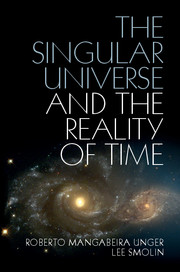Book contents
- Frontmatter
- Contents
- The nature and scope of this work
- Part I Roberto Mangabeira Unger
- Part II Lee Smolin
- 1 Cosmology in crisis
- 2 Principles for a cosmological theory
- 3 The setting: the puzzles of contemporary cosmology
- 4 Hypotheses for a new cosmology
- 5 Mathematics
- 6 Approaches to solving the meta-law dilemma
- 7 Implications of temporal naturalism for the philosophy of mind
- 8 An agenda for science
- 9 Concluding remarks
- Acknowledgments
- References
- A note concerning disagreements between our views
- Index
1 - Cosmology in crisis
Published online by Cambridge University Press: 05 December 2014
- Frontmatter
- Contents
- The nature and scope of this work
- Part I Roberto Mangabeira Unger
- Part II Lee Smolin
- 1 Cosmology in crisis
- 2 Principles for a cosmological theory
- 3 The setting: the puzzles of contemporary cosmology
- 4 Hypotheses for a new cosmology
- 5 Mathematics
- 6 Approaches to solving the meta-law dilemma
- 7 Implications of temporal naturalism for the philosophy of mind
- 8 An agenda for science
- 9 Concluding remarks
- Acknowledgments
- References
- A note concerning disagreements between our views
- Index
Summary
The crisis introduced
For those who want to know the answers to the big questions about the natural world, the fundamental sciences whose role is to discover the answers to those questions are in a most puzzling state. There is certainly reason to celebrate the greatest triumphs in the history of the physical sciences. Powerful theories based on great principles have given us an unprecedented understanding of nature on a vast array of scales of space, time, and energy. The great theories invented through the twentieth century – general relativity, quantum mechanics, quantum field theory, and the standard model of particle physics – have yet to fail experimental test. These theories have given us detailed and precise predictions for phenomena as diverse as gravitational waves emitted by orbiting neutron stars, the scattering of elementary particles, the configurations of large molecules, and the patterns of radiation produced in the big bang – and in all these phenomena, which were not even dreamed of a century ago, those predictions have proven correct.
But just as the physical sciences celebrate their greatest triumphs, they face their greatest crisis. This crisis lies in our failure, despite what has been now many decades of effort by increasing numbers of scientists, to complete the scientific revolution that was initiated by Einstein’s discovery of the quantum nature of radiation and matter and his simultaneous invention of relativity theory. These two revolutions are each successful in its own domain, but remain unjoined.
Information
- Type
- Chapter
- Information
- The Singular Universe and the Reality of TimeA Proposal in Natural Philosophy, pp. 353 - 366Publisher: Cambridge University PressPrint publication year: 2014
